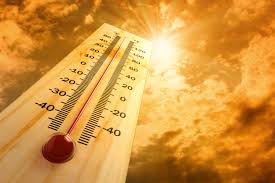By Consultant Pediatrician Dr. Rajam Natarajan
The scorching heat of ‘Agni Nakshatram’ as it is familiarly called, spares nobody. All of us would love to remain at home between 11 am – 3 pm during summer. But for children summer vacation is the time they can meet their friends, play cricket, go for movies and spend their evening time in the beach. They do not mind exposing themselves to hot sunrays while playing with their peer groups.
Also read: Summer skin care tips
In newborns:
The skin temperature rises if the environmental temperature goes high. Their thermoregulatory centre in the brain is not fully matured and they do not have adequate subcutaneous fat under the skin. So they don’t sweat.
Especially if they are covered with too many layers of thick clothes and if there is no ventilation in the room their body temperature goes high. This is mistaken by the young mothers for fever and they get worried and sometimes give antibiotics to the child.
If the baby is breastfeeding frequently and passes urine 6 – 8 times a day and is active, one need not get worried, even additional water supplement is not necessary since the breast milk water content is high and the foremilk which comes out first quenches the thirst of the baby.

The newborn neck is very narrow and there is not enough air movement. During feeding, a few drops of milk may trickle down to the neck and this is a good medium for bacteria to grow. The babies develop fine rashes, and erythematous excoriation in the neck in summer.
Treatment: We have to keep the neck clean by wiping it with sterile wet cotton and dry it. Similarly, in the skin adjacent to external genitalia and groins babies develop fungal infection since we always cover that area with thick nappies and wrappers.
Also read: Hair care tips
Bacterial skin infections are common in pediatric age group. They sweat a lot in the scalp while playing and when they play outside some amount of dust and sand are deposited on the scalp. If they are not cleaned properly they will have skin scratching, followed by streptococcal skin infection. So they develop pustules and boils over the scalp.
Treatment: When the children return home after playing they can have a bath and clean their hands and feet.
Summer diarrhoea:
During hot days thirst is more and children tend to take an artificial drink, fruit juices and water wherever available. If it is not a quality product, they will get infections and develop viral or bacterial diarrhoea. The mother should know about the signs of dehydration in infant-like sunken eyes, dry tongue and eyes and irritable child. Older children are restless, irritable and dizzy, when the weather is very hot.
Treatment: The child has to be given a lot of oral fluids in the form of water, fruit juices, electrolyte solution tender coconut water, buttermilk etc.
Heat stroke:
It is a particularly dangerous type of high temperature because the body is not able to stop the temperature from continuing to rise. It can happen if a child is left in a hot place or somebody exercises strenuously without taking adequate water some children may develop convulsion at the rise of temperature.
Treatment: Steps should be taken to lower the temperature by cold sponging and giving a lot of liquids to drink. The child can be kept in A .C room if available.
Also read: Healthy Indian foods to eat this summer
Sunburn:
Kids are more likely to get hurt during summer than at any other time. They are at risk for sunburn injuries and it leads to skin damage and later skin infection.
Treatment: Take the child away from the sun and rehydrate with liquids, cold sponge bath can be given. Sunscreen lotion can be applied before exposure to the sun.
Ear pain:
Some children may get ear pain after they go for swimming in the pool. It develops when excess moisture allows the bacteria that are commonly present in the ear to multiply.
Treatment: We have to rule out middle ear infection which would hurt consistently. If the child has swimmer’s ear, the ear will hurt if touched or when she chews. The child can wear a cap and he can shake the water out of his ears when he gets out of the pool.
Exanthematous fever:
It is common in summer months like measles, chickenpox and mumps etc.
Treatment: The child has to be given appropriate vaccination at the scheduled month to prevent the child suffering from the disease.
Poisoning:
Colourless disinfectant solutions, kerosene etc should not be kept in the bottle within the reach of the child. If the child is thirsty, he will mistake that bottle for water and he may take it.
Treatment: The child has to be taken to the hospital.
Also read: 100 most nutritious foods by BBC
